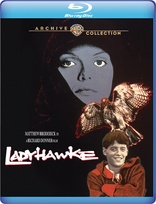Ladyhawke Blu-ray Movie
HomeLadyhawke Blu-ray Movie 
Warner Archive CollectionWarner Bros. | 1985 | 121 min | Rated PG-13 | May 05, 2015
Movie rating
7.1 | / 10 |
Blu-ray rating
| Users | 4.3 | |
| Reviewer | 4.0 | |
| Overall | 4.0 |
Overview
Ladyhawke (1985)
An escaped thief, Philippe Gaston, is befriended by the fugitive Captain Navarre, former commander of the Bishop’s guard and now suffering under a curse that transforms Navarre into a wolf by night. The same curse transforms Navarre’s true love, Lady Isabeau, into a hawk by day, so that the lovers can never be together in human form. The curse was the Bishop’s revenge when Isabeau spurned him. Navarre asks Philippe’s help in seeking revenge against the Bishop.
Starring: Matthew Broderick, Rutger Hauer, Michelle Pfeiffer, Leo McKern, John Wood (I)Director: Richard Donner
| Romance | Uncertain |
| Drama | Uncertain |
| Comedy | Uncertain |
| Adventure | Uncertain |
| Fantasy | Uncertain |
Specifications
Video
Video codec: MPEG-4 AVC
Video resolution: 1080p
Aspect ratio: 2.37:1
Original aspect ratio: 2.39:1
Audio
English: DTS-HD Master Audio 5.1 (48kHz, 24-bit)
Subtitles
English SDH
Discs
50GB Blu-ray Disc
Single disc (1 BD)
Playback
Region A, B (C untested)
Review
Rating summary
| Movie | 4.0 | |
| Video | 4.5 | |
| Audio | 4.5 | |
| Extras | 0.5 | |
| Overall | 4.0 |
Ladyhawke Blu-ray Movie Review
Ferris Bueller's Fairy Tale
Reviewed by Michael Reuben May 4, 2015A wolf, a hawk, crumbling medieval castles and an American-sounding thief with a French name who occasionally affects a bad English accent—these are the chief ingredients of the unlikely fantasy cult classic, Ladyhawke. Matthew Broderick, who plays the thief, received top billing over Rutger Hauer and Michelle Pfeiffer, because in 1985 Broderick was better known, thanks to the success of WarGames. Hauer's iconic status for Blade Runner would not solidify for several years, and Pfeiffer's career was just getting started, her most visible role to date being Al Pacino's coke-addled beloved in Scarface. Ladyhawke was a passion project for producer/director Richard Donner, whose name is more often associated with big-budget franchise pictures like the original Superman or the Lethal Weapon series. But Donner has a quirky side, and no film has expressed it more directly than this magical fable set in the Middle Ages with a comic sensibility that is strictly modern. The odd mixture sometimes suggests another Eighties storybook film, Rob Reiner's The Princess Bride, but Ladyhawke doesn't bother with the kind of devices invented by screenwriter William Goldman to provide an ironic distance on the story's fantastical elements. Donner's film has no present-day grandfather reading to his grandson, no suggestion that the story is all invented by an author, no sense that the imaginary elements are just playful entertainment for the child in all of us. Everything about Ladyhawke is presented literally, even its moments of magic. The film demands a much greater effort on the part of its audience to suspend disbelief, but the rewards are worth it. Ladyhawke received a mildly favorable critical reception in 1985, but it was a box office failure. Its reputation has been sustained over the years on home video, despite problematic presentations on VHS, laserdisc and DVD. The Warner Archive Collection is releasing the film in a Blu-ray presentation that is a substantial upgrade over all previous versions, thanks to restoration work by the wizards at MPI.
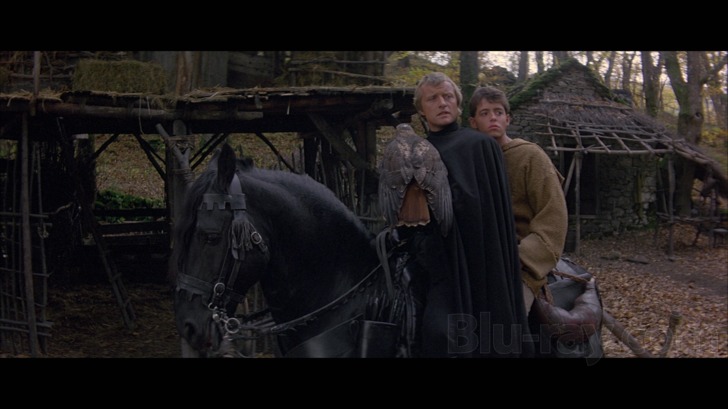
In the 12th Century, the Italian city of Aquila is ruled by a ruthless and corrupt Bishop (Jon Wood), whose word is law. A career thief named Philippe Gaston, nicknamed "Mouse" (Broderick), escapes from the city's dungeons through its drainage system. A party of the Bishop's guards pursue him, lead by their captain, Marquet (Ken Hutchison). In the countryside, Philippe encounters Marquet's predecessor, Captain Etienne Navarre (Hauer), a commanding and taciturn figure who is always accompanied by a hawk. Navarre has been looking for Philippe, having heard of his miraculous escape from the dungeons of Aquila. He wants the Mouse to help him break into the city, from which Navarre was banished by the Bishop two years ago. Philippe immediately senses something wrong. "There are strange forces at work in your life", he tells Navarre. "Magical ones that surround you. I don't understand them, but they frighten me." Among those magical forces is a blue-eyed, porcelain-skinned beauty who only appears at night, often in the company of a large black wolf. Philippe will later learn that her name is Isabeau (Pfeiffer), that she is Navarre's true love, and that the Bishop became enraged when she spurned his advances and wreaked a magical vengeance on both Isabeau and Navarre. The audience has figured out who is what long before the travelers reach the crumbling abode of a priest named Imperius (Leo McKern, the familiar face of Rumpole of the Bailey), who fills in the details of the lovers' sad history. They have been permanently separated by the Bishop's spell, granted only a glimpse of each other at sunrise and sunset. Although Imperius believes he has found a way to break this curse, Navarre no longer trusts him and wants only to enter Aquila undetected so that he can kill the Bishop. The journey to Aquila proceeds by fits and starts. As soon as the Bishop learns from Marquet that Navarre has returned, he sends even more members of his guard to hunt him. He also summons a grinning wolf trapper named Cezar (Alfred Molina, almost unrecognizable), whom he dispatches with specific instructions to kill and skin a black wolf that will be found in the company of a beautiful woman named Isabeau. In addition to the peril of their pursuers, the lovers and Philippe are at constant risk from the treachery of the elements and the people they encounter on their journey, none of whom can be trusted. The Bishop has taxed the local populace heavily, and hungry people will cut a stranger's throat for whatever money or goods he may have. Despite its historical references, Ladyhawke is pure fairy tale, and the script by Edward Khmara (Dragon: The Bruce Lee Story), Michael Thomas (The Hunger), Tom Mankiewicz (Superman) and David Webb Peoples (Unforgiven) makes no pretense otherwise. Likewise, Donner's direction aims for the magical and mythic, with scant effort at realism. Even the acting styles are drawn from different realms, with Wood and McKern employing the theatrical diction they might use for Shakespeare, Hauer adopting a timelessly heroic pose and Broderick and Pfeiffer behaving as if they had just stepped in from Santa Monica Boulevard. Somehow these disparate styles mesh, aided in large part by Broderick's running commentary as Philippe, part observation and part comic relief, as the former thief constantly questions, banters and bargains with God. "We have come full circle, Lord", he says, as they return to Aquila. "I would like to think there is some higher meaning in this. It certainly would reflect well on You." Phillipe also becomes a kind of messenger between Isabeau and Navarre, telling each of them about the constancy of the other's love. He's making up the words, but the sentiments he conveys are real, which ends up as a sly observation about how fiction can sometimes be more truthful than fact. Donner has always preferred to photograph real objects rather than employ miniatures or rear projection, and he shot Ladyhawke on location in the Italian countryside, using authentic castles and towns as background. For the film's finale, in which Navarre and Marquet battle on horseback inside a cathedral, a massive set was constructed at Rome's Cinecittà Studios. At heart, Ladyhawke is a simple story of love and friendship, but it has all the scale and majesty that a fairy tale epic demands.
Ladyhawke Blu-ray Movie, Video Quality 
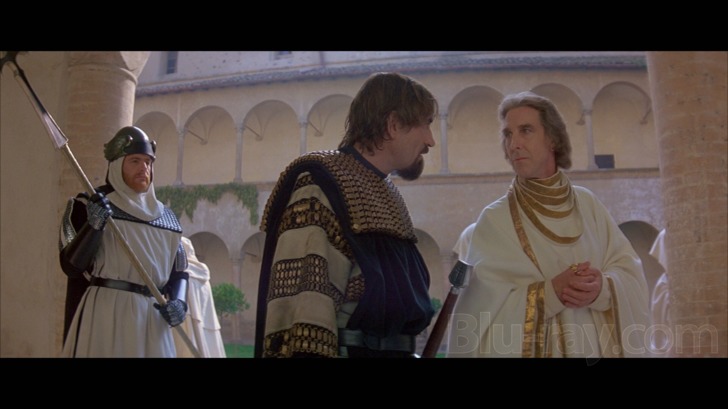
Ladyhawke was shot by three-time Oscar-winning cinematographer Vittorio Storaro (The Last Emperor) in the format known as "Technovision", an anamorphic competitor to Panavision that Panavision later acquired. The transfer used by the Warner Archive Collection ("WAC") for its 1080p, AVC-encoded Blu-ray was originally prepared by Fox, which owns the film's international distribution rights. Upon review of Fox's master, WAC decided that additional work was needed and called upon the services of Warner's on-site facility, MPI. MPI proceeded to do substantial additional color correction and grading, as well as major cleanup. The result is a new presentation of Ladyhawke that is unique to this WAC release. It is a revelation. The details of the Italian countryside, the city of Aquila, the country inn where the travelers stop to rest, the crumbling structure where Imperius lives and the cathedral interior where Navarre confronts the Bishop are all finely rendered with a clarity beyond anything I have ever seen on a home video display. The blacks, densities and contrast are all impressive, but even more so is the intensity of the colors, especially the all-important reds of the sunsets and sunrises and the intense blues with which Storaro floods the nighttime sequences. So vivid is the image that even the opticals used to render certain key effects do not noticeably distract. An obvious and important example of MPI's cleanup work can be seen (or, rather, not seen) in the film's final reel. All previous widescreen versions with which I am familiar showed two spots, one dark and one light, that disappeared and reappeared, depending on the shading of the background. The dark spot occupied the right half of the frame, and the light spot was positioned farther down in the left. Apparently these were flaws in the negative, and they quickly became permanent distractions during the film's emotional conclusion. Working frame by frame, MPI has removed these spots. Screenshots 28 and 29 offer a comparison between the Blu-ray and the DVD to show what was erased. (Warning: Since this is the end of the film, some might consider this image a spoiler, which is why I have placed it after the menu screenshot.) On the DVD, the dark spot is visible against the second hooded figure to the right of Pfeiffer, while the light spot stands out to the left of her against the stone floor; both reappear throughout the film's ending, but on the Blu-ray they have (finally) disappeared, as have many other small flaws in the source. (Note that the DVD was not enhanced for 16:9, which is why the image is windowboxed.) The film's natural grain pattern is finely rendered, and WAC has followed their usual practice of encoding at a high average bitrate, specifically 35.00 Mbps, ensuring that no fine detail had to be rolled off or filtered away. The opening credits are windowboxed. This appears to have been Fox's choice, and WAC has retained it.
Ladyhawke Blu-ray Movie, Audio Quality 
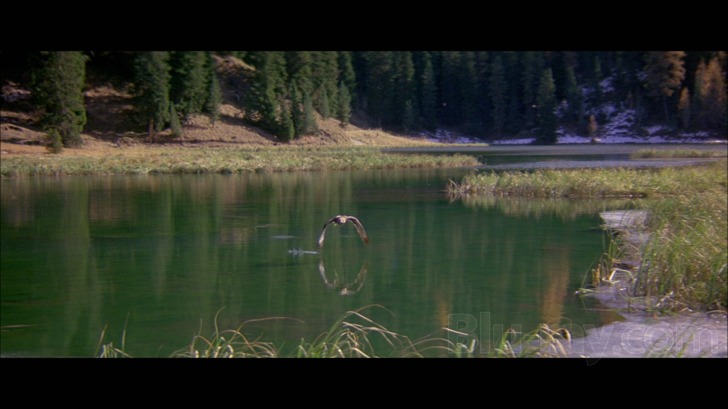
Ladyhawke was released to theaters in Dolby Stereo, and there was also a six-track mix for 70mm blow-ups. When Warner released the film on DVD in 1997, the soundtrack was remixed for DD 5.1. The same mix is presented here in lossless DTS-HD MA, and, with a major caveat discussed below, it sound terrific. While rear channel effects are limited, stereo separations are clear, particularly with the sounds of the hawk's cry as it flies, the wolf's distant howl and the beat of horses' hooves. The clang of swords against shields and armor is distinctive, especially when it echoes inside the cathedral in the final sequence, and Philippe's escape from the dungeons involves numerous sounds of water, as he navigates the city's drainage system. Dialogue is clear and mostly locked to the front center. Ladyhawke's score is well-reproduced, but the score itself has been controversial almost from the moment the film was released. Like Dune and Flash Gordon, the film is a prime example of an Eighties trend to experiment with using pop musicians to score fantasy cinema. In this case, the composer was Andrew Powell, the chief arranger for The Alan Parsons Project, to whose music Donner was reportedly listening while scouting for locations. (Parsons served as the score's producer.) An unusual combination of progressive rock, orchestral performance and Gregorian chant, Powell's score has been criticized for not suiting the material and, more recently, for being dated. One critic has called it the "worst soundtrack ever composed". I'm not going to defend Powell's score as an underappreciated gem, because parts of it are definitely odd, but other parts are haunting and beautiful. Besides, this is the score Donner wanted, and Ladyhawke wouldn't be Ladyhawke without it. If you find the film moving, as I do, then you accept its peculiarities as part of the experience.
Ladyhawke Blu-ray Movie, Special Features and Extras 
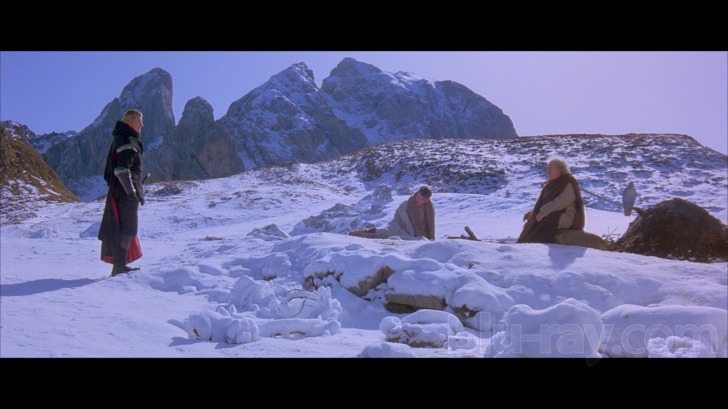
Other than a trailer (480i; 1.85:1, enhanced; 1:33), the disc has no extras. Warner's 1997 DVD was similarly featureless.
Ladyhawke Blu-ray Movie, Overall Score and Recommendation 
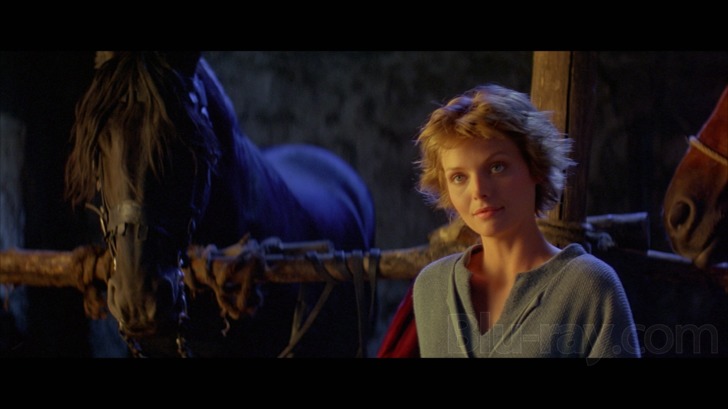
Fans of Ladyhawke will want to grab this Blu-ray immediately. It is the finest presentation to date and the first truly great version ever offered. Those new to the film should proceed with caution, because Ladyhawke is not for everyone. It is, if you'll forgive the phrase, a strange bird, but an endearing one. WAC has done it proud.
Similar titles
Similar titles you might also like

Sword of the Valiant: The Legend of Sir Gawain and the Green Knight
1984

Jack the Giant Slayer
2013

Roman Holiday 4K
70th Anniversary
1953

The Sure Thing
1985

The Tempest
2010

Virgin Territory
2007

Mannequin
1987

Big Fish 4K
2003

Winter's Tale
2014

Pretty Woman
1990

Edward Scissorhands 4K
35th Anniversary
1990

At Middleton
2014

Nothing in Common
1986

Mannequin Two: On the Move
1991

First Knight
1995

The Secret Life of Walter Mitty
1947

Xena: Warrior Princess
1995-2001

Romancing the Stone
1984

Camelot
45th Anniversary Edition
1967

Practical Magic
1998
